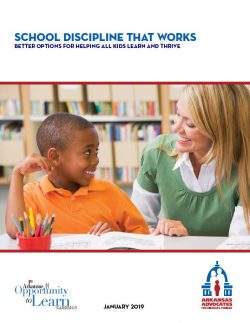
Many Arkansas public schools still use ineffective and discriminatory school discipline policies. As a member of the state’s Task Force on School Discipline, Arkansas Advocates calls for more effective, research-based options to help improve outcomes for kids and schools.
Arkansas has one of the highest rates of exclusionary discipline in the nation, such as in-school and out-of-school suspensions and expulsions. Arkansas is also one of only 19 states still allowing public schools to use corporal punishment, even for students with disabilities. More than 80 percent of school districts in Arkansas still spank students. Statewide, students were hit a total of 15,453 times in the 2017-2018 school year. Research shows these disciplinary methods do not improve student behavior but do have long-term negative effects on mental health and achievement.
Research in Arkansas and across the country also shows that children of color are punished far more frequently and harshly for the same behaviors as their white classmates. Students with disabilities are five times more likely to be spanked as students without.
We should all care about school discipline, because it affects the quality of neighborhood schools, graduation rates, community safety, and costs to taxpayers. Harsh, arbitrary, and discriminatory school discipline increases the chance kids will drop out and end up in the juvenile justice system.
There are many proven methods for improving students’ behavior and well-being that cost little to no money. Many schools across the state and country are using creative approaches with positive results, such as restorative justice and mindfulness meditation.
In its report, Arkansas Advocates presents several recommendations to help all Arkansas students thrive, including:
- Providing more training and support for teachers, administrators, and parents on school discipline that works;
- Increasing the number of school counselors and social workers in schools who can help students and families before behavioral problems begin; and
- Banning corporal punishment in all publicly-funded schools — especially for students with special needs.
Download a copy of the report below.
